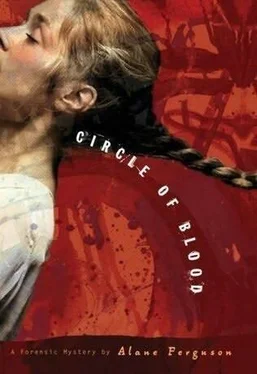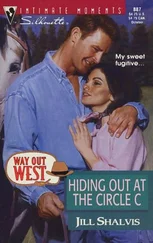Sighing, he said, “Two people dead in one day. It’s too much death.”
“Dad, I’m all right,” she protested. “Don’t worry, I promise, I can take it.”
“I meant for me.”
The emotion in her father’s voice surprised her. He was the one who had told her they had to detach in order to be death’s detectives. “The chances of dying are one hundred percent,” he’d say. “The only thing to be determined is where and how. If you find yourself getting too emotional, think statistically. We all have an expiration date.”
“Dad, what is it?” she asked now.
She heard him hesitate. “Sheriff Jacobs told me- Cammie-this one’s a suicide. Some kid put a bullet in his head. An accident I can understand, but taking your own life when you’re young and you’ve got your whole life ahead of you… It’s just hard to think someone would do that to themself.”
“Oh,” she said. She had just assumed this would be a garden-variety death. Like Benjamin, people died in car wrecks. Sometimes they drowned. Mostly they were old and their bodies just gave out. But a suicide?
Her father’s voice began to crackle over the line. She knew she was going to lose him soon. The reception from the mountain was spotty at best, especially in a storm. “You know the drill,” he told her. “Jacobs can’t get-ID until-a coroner-the scene. That-you. Do you think- can work it-a while?”
“Sure,” she answered, sounding more confident than she felt. The thoughts of her mother were shoved aside, quickly and completely. There was no room in her head for Hannah. For the first time she wouldn’t fill the role of assistant to the coroner, she’d be the coroner herself.
“-hurry. There’s-body- ”
"I’m on my way,” she said, but it didn’t matter. The line was dead.
THE CRIME SCENE: DO NOT CROSS tape was already stretched taut across the passageway, wrapped tightly around gas meters located at the front corner of each building. From her car Cameryn could see a knot of people pressing against the tape, trying to get a better look at the scene. Two teenage girls held their cell phones high, snapping pictures, the flash barely illuminating the brick wall with weak flickers of light while the rest of the town crowded to take photos. Silverton’s own, homegrown paparazzi.
Tapping her car horn, Cameryn motioned them away but the people barely moved, reluctant to yield their spots. She hit her horn again, longer this time, then eased the car against the curb and put it in park. Their family’s cream-colored station wagon doubled as Silverton’s only hearse, which meant that many a person took their final journey in the back of the Mahoney automobile, which was still sporting the San Juan County Coroner magnet from earlier that day. Lyric swore the wagon had a negative energy, a claim Cameryn found ridiculous. She’d never noticed anything more than a faint odor that sometimes clung to the car’s interior, which dissipated when the windows were down. Now, grabbing the death kit and camera, Cameryn braced herself for what lay ahead.
By the time she reached the sidewalk the group had swelled to over thirty, mostly people from the festival. It was hard to push through their stolid bodies; the plastic tape bowed in as the people in the back strained against those in front. The tape would break, Cameryn knew, if they pressed much harder.
“Hey, folks, stay back!” she heard Justin bark. “This is police business. Step away from the tape.”
The crowd shifted en masse, moving perhaps a foot toward the street. They looked like cows at a fence, Cameryn thought, their bovine faces placid, their necks straining to see over their yellow tape as though it were a split rail.
“Excuse me,” Cameryn announced. “Excuse me-I need to get through.”
“Find your own spot, kid,” a man grunted. “We’re all here to see the same show.”
“I need to get in there. I’m assistant to the coroner.”
He turned to look at her. The idea seemed to amuse him. The man’s eyes did a sweep to register her long hair and blue jeans, her five-foot-three frame and her pink ski parka with the Gonzo tag. “Yeah,” he snorted. “Right.”
Suddenly Deputy Justin Crowley appeared, tall and imposing as he lifted the tape for Cameryn, waving her in.
“We’ve been waiting for you, Coroner,” Justin said. Instead of speaking to Cameryn he directed his words toward the man, who immediately took a step back.
“Sorry, I got here as fast as I could,” she said as she ducked beneath the tape, her StreetPro gear bag clutched to her chest like an unopened parachute.
“I swear,” she heard the man muttered, “they’re looking younger every day.”
Inside the StreetPro bag were a white sheet, three pairs of latex gloves, a new body bag, a gunshot-residue kit, a dental ruler for scale, paper and plastic bags, shoe covers, medical tape, and a clipboard. Her digital camera hung from a strap around her neck. The plastic tarp she’d spread for Benjamin was still in the bay of their station wagon, beneath the gurney, smooth and shiny. Not a drop of Benjamin had leaked out of the body bag, so there’d been no need to replace it.
The passageway was an eight-foot-wide sliver that ran between the Carriage House and the Highlander Apartment Building. To the south and parallel to Greene Street, a narrow alleyway opened to the back walls of businesses that stood shoulder to shoulder on Greene Street. In order to keep the alleyway clear, snowplows had piled the snow into a towering wall wedged between the two buildings. In front of that icy barricade lay the body, a patch of blue illuminated by a bank of lights.
“She’s right up ahead,” Justin told her. “Gun’s still in her hand.”
Cameryn stopped. “She? It’s a female? Dad said it was a boy.”
“Well, actually, it’s hard to tell. We won’t know for sure until we turn her over. The hair’s short enough for a boy but the shape looks more like a girl to me. That’s why we need you here.” He put his hand on the small of her back, propelling her forward. “We lawmen can’t touch the decedent until the coroner releases it. You’ve got the power.”
“All I need is the photographs and then you can roll her,” Cameryn said. “Or him.”
“That’s the idea.”
Although narrow, the passageway was more than one hundred feet long, bricked in on either side by walls more than three stories high. A 1,000-watt halogen work light illuminated the snow so that it sparkled as though it had been salted with diamonds. In the distance Cameryn could make out a figure lying, head toward the wall, its feet sprawled apart at an odd angle. She could see the gentle rise of the back, the blue jeans-clad legs, the tread of the sneakers, and a halo of short blonde hair moving in the winter breeze like seaweed beneath water. It was the blue of the parka that caught Cameryn’s eye-the same bright blue Mariah had worn. For a moment she started as the thought Mariah flashed through her mind. But blue parkas were a dime a dozen, she reminded herself, and the hair was short, not long and in a braid. Realizing this, Cameryn’s heart began to beat again.
Justin stopped her. “What’s up? You just turned as white as the vic.”
“Nothing. I’m just thinking of the stuff I have to do,” she lied, covering up with a barrage of words. “Did I tell you we’ve switched to using only a digital camera?” Holding her camera away from her chest, she babbled, “The pictures are stamped electronically so you can tell if anything’s been altered, which means a digital shot will stand up in court. So that’s all I’m using now-no more black-and-white. We just put it on a disk and then we’re done. It saves a lot because of the higher cost of regular film.”
Читать дальше












